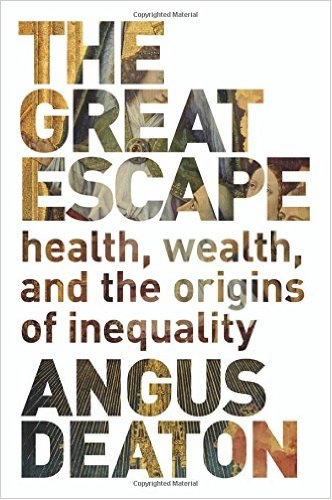
Why have we seen such dramatic improvement in average wealth and average life expectancy everywhere in the last 100 or 200 years? What has led to a radical reduction in the number of people living in dirt-eating poverty in the last 50 years?
Over the last few years I have focused a lot of my reading on economics and history trying to figure out the answers to those questions. Why?
If we figure out the answer to those questions we can continue in the same direction. If we sort out how we got here, we can share that strategy with those who have not shared in the progress. If you want a different phrasing, we can radically narrow economic inequality within countries and between countries if we can answer those questions. We can help get even more people out of dirt-eating poverty.
I think those goals are in the back of the mind for most readers of this blog.
Imagine my surprise when I read this morning that Angus Deaton won the Nobel Memorial Prize in Economic Science this year. Check out articles from The New York Times and Associated Press.
I chuckle when my limited reading & understanding of economics matches up with the Nobel award in economics. First time that happened was when Milton Freeman was so honored while I was in college. I distinctly remember my economics instructor being disgusted at the idea. That was an early indication that some people aren’t as fond of economic freedom and liberty as I am.
If you want to dive into the question yourself, I heartily recommend Prof. Deaton’s book, The Great Escape: Health, Wealth, and the Origins of Inequality. That is one of several books on economics I am working through at the moment.
My favorite review of the book is from 2013 in The New York Times: A Cockeyed Optimist.
I might not do justice to the book in giving a few word summary, yet I will try:
His point is essentially that today most people in most places on most measures are doing far better now than 50, 100, and 200 years ago.
Ironically, the cause of inequality is economic growth. Some people are invariably the first to benefit from improved economic performance, technological developments, or improved health outcomes. That creates a split between those who are benefiting and those who have not. Eventually the benefits spread. Other people catch up, perhaps slowly or perhaps quickly and the inequality narrows.
Multiple charts and graphs makes the point that the people who lagged in benefiting from developments are doing better today than the super-rich were 100 or 200 years ago. Everyone is better off. That is wonderful progress.
Again, I heartily recommend his book if you want to dive into the issue of how we share economic progress with those left behind. This book is not the direct reason why he won the economics prize yet you will benefit directly from checking it out.